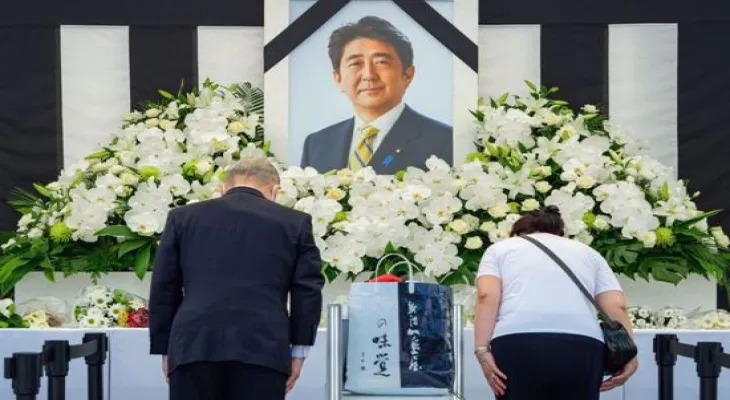Search here
Newspaper
Search here

Arab Canada News
News

Published: September 27, 2022
On Tuesday, a rare official funeral took place for the assassinated hardline Japanese leader, Shinzo Abe, which was filled with military pomp and surrounded by crowds of mourners as well as widespread protests, as thousands took to the streets to protest opposition.
Japanese Prime Minister Fumio Kishida said the publicly funded ceremony was a deserved tribute to Japan’s longest-serving recent political leader, but it caused a deep division in public opinion.
The event was attended by U.S. Vice President Kamala Harris, Japanese Crown Prince Akishino, and other foreign and Japanese figures. It began with Abe’s widow, Akie Abe, wearing a formal black kimono, slowly walking behind Kishida to the funeral venue, carrying an urn in a wooden box wrapped in a purple cloth with gold stripes. Soldiers dressed in white uniforms took Abe’s ashes and placed them on a base filled with chrysanthemums and white and yellow decorations.
The attendees stood while a military band played the national anthem Kimigayo, then stood for a minute of silence before a video was shown praising Abe’s life in politics. It included his 2006 parliamentary speech where he pledged to build a "Beautiful Japan," his visits to northern Japan devastated by the March 2011 tsunami disaster, and impersonating Super Mario in 2016 in Rio de Janeiro to promote the Tokyo 2020 Olympics. In a 12-minute eulogy, Kishida praised Abe as a politician with a clear vision for economic growth in the post-World War II period who strengthened national security, developed Japan and the world, and the "free and open Indo-Pacific region" against the rise of China. Kishida also referred to Abe’s post-war system trademark phrase "under
Kishida, looking at a huge picture of Abe, said: "You were a person who should have lived much longer." "I had a firm belief that you would contribute as a compass showing the future direction for Japan and the rest of the world for another 10 or 20 years." Kishida said Abe would be remembered not only as the longest-serving national leader but for his achievements, pledging to continue Abe’s policies for Japan and the region.
During the ceremony, Harris sat in the third row next to Ram Emanuel, the U.S. Ambassador to Japan, and they later joined others by placing a chrysanthemum branch on a table near Abe’s picture.
Abe’s body was cremated in July after a private funeral at a temple in Tokyo days after his assassination while delivering his election campaign speech on a street in Nara, western Japan. Tokyo was under heavy security for attending the official funeral, especially near the venue, the Budokan martial arts hall. In a protest in central Tokyo, thousands of people marched toward the hall, some beating drums and many shouting or carrying signs indicating their opposition.
Participant Kaoru Mano said, "Shinzo Abe did not do a single thing for ordinary people."
Major opposition political parties in Japan boycotted the funeral, with critics saying it is a reminder of how pre-war imperial governments used official funerals to stir nationalism.
The government insists the ceremony was not intended to force anyone to honor Abe. But the decision to grant the rare honor, made without parliamentary discussion or approval, the high cost, and other controversies, sparked anger over the event.
Kishida was also criticized for the growing controversy over decades of close relations between Abe and the ruling Liberal Democratic Party with the Unification Church, accused of collecting huge donations.
The fact that the close ties between the Liberal Democratic Party and the Unification Church may have interfered in policymaking is considered by the Japanese people a greater threat to democracy than Abe’s assassination, "
wrote Hosei University political science professor Jiro Yamaguchi in a recent article. Abe's grandfather, former Prime Minister Nobusuke Kishi, helped the South Korea-based church take root in Japan and is now seen as a key figure in the scandal.
Opponents say holding an official funeral for Abe amounts to endorsing the ruling party’s ties to the church. Retiree Shin Watanabe said during Tuesday’s protest: "One of the big problems is that there was no proper approval process." "I am sure there are different viewpoints. But I don’t think it is forgivable that they imposed an official funeral on us when many of us oppose it. Editor: Yusra Bamtraf
Comments